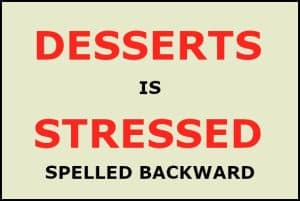Descriptions and Terminology | Childhood Obesity News

Here is an example of everyday craziness that we somehow manage to calmly assimilate and probably not even notice. A person may speak of raising funds for charity. Of course we know what that means. They want to collect some money from people who have it, to spend on helping people who don’t. But… a person may speak of raising funds for birth defects, or for COVID-19. Of course we know what that means. They hope to finance some needed research that can put a stop to deformed fetuses or coronavirus.
But despite using the same operative word, “for,” the two ambitions are exactly opposite. In the first instance, “for” charity means that the speaker is in favor of helping the less fortunate, and recognizes the granting of aid as a good that should be supported. In the second case, collecting money “for” COVID-19 means that the speaker is against the virus, and recognizes it as an evil that should be eradicated.
People have gone out and demonstrated, and have marched for peace, for babies, for life, and for justice. People have also identified themselves, proudly, as marching for cancer. Obviously, this is a complete contradiction in terms, a verbal construction that is incorrect, meaningless, and ridiculous. And yet it is recognized as legitimate by those who march, and those who contribute to the cause. Conscientious and caring people have “marched for meals,” and responsive and responsible people have “marched for hunger.” And yet, logic tells us that those are opposite goals, of which one is being misidentified.
April Fool all year long
The meme at the top of this page is a joke. The fact that “stressed” and “desserts” spell each other backwards is totally insignificant, and no sane person would believe otherwise. One trait of mental illness is that an individual tends to get all wrapped up and bogged down in seemingly meaningful coincidences in numbers and words. A feverish, wide-eyed obsessive may reveal in a hushed tone that God is dog spelled backwards, earnestly convinced that this means something. The listener may argue that in French, the two words are Dieu and chien, which do not spell each other backwards — but to no avail.
Are other languages as confusing as English? How do we know when some linguistic detail has meaning, versus when it is just random chance?
Lots of words
We have all kinds of terminology for unhealthy consumption patterns — stress eating, nervous eating, recreational eating, binge eating, compulsive eating, emotional eating, and so on.
And then, there is comfort eating. Aren’t they, at the bottom, all the same entity? The first group of terms represents eating caused by stress, nerves, boredom, unruly emotions, irresistible compulsion, etc. Those are names for what causes unwholesome consumption. The single term, comfort, is a name for the result of unhealthy eating in the person’s body and mind — at least, temporarily — which is an escape from stressful discomfort. Whether looked at from one end or the other, it’s all the same pathological behavior.
It sure looks like stress eating is the same as comfort eating. A person is trying to escape stress and to achieve comfort, isn’t that what it all boils down to? The stress eater, the nervous eater, the bored eater, and the emotionally traumatized eater, all have the same goal: to transform themselves into someone who is no longer troubled by stress, nerves, hurt feelings, or whatever; and to experience comfort instead. One moment — when seeking relief — you’re a stress eater. The next moment — having obtained relief — you’re a comfort eater. Or more likely, you were both, all along.
A while back, E. Leigh Gibson published a paper that said,
In the academic literature, the normal understanding of comfort eating is eating to relieve negative emotions or affect (typically depression, anxiety or anger), which is synonymous with “emotional eating” (at least where the definition is restricted to negative emotions), the latter being the more commonly used term in such literature… Another term with similar meaning is ‘stress eating’, that is eating induced by stress…
Gibson also says,
Human and animal theories and models of emotional or stress-induced eating show some convergence, and may incorporate genetic predispositions such as impulsivity and reward sensitivity, associated with dopamine dysregulation underlying incentive salience.
Recently, however, as Dr. Pretlow points out, both genetics and dopamine dysregulation have been doubted.
In creating a definition, another little wrinkle shows up. Okay, comfort eating is the sort induced by negative affect, like depression, anger, indecision, rumination (too much thinking), workplace stress, emotional turmoil — anything negative. Which technically could include plain old gnawing physiological hunger. So, under that definition, just regular everyday eating to satisfy the demands of the body is also comfort eating!
Your responses and feedback are welcome!
Source: “The psychobiology of comfort eating: implications for neuropharmacological interventions,” NIH.gov, Sept 2012
Image by Pat Hartman








